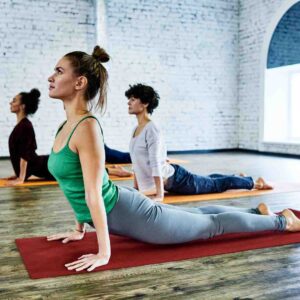Table of Contents
Introduction
Pilates for Strength and Flexibility
How Pilates Improves Posture
Pilates' Mind-Body Connection: Stress Reduction and Mental Health
Q&A
Conclusion
"Pilates transforms body and mind."
Introduction
Pilates improves flexibility, core strength, and mental and physical health. It was created by Joseph Pilates in the early 20th century and has become renowned as a low-impact workout for all ages and fitness levels. Pilates improves posture, balance, and coordination through regulated movements and breathing.
Pilates for Strength and Flexibility
Pilates is growing popularity. This low-impact workout improves flexibility, strength, and balance. Pilates, created by Joseph Pilates in the early 20th century, has become popular worldwide.
Pilates boosts flexibility. Pilates stretches and lengthens muscles to improve range of motion and reduce injury risk. Pilates improves posture, which reduces back pain and other musculoskeletal disorders.
Pilates strengthens and stretches. Pilates workouts tone and strengthen certain muscle groups. Pilates improves posture and balance by strengthening core muscles.
Pilates is low-impact. Pilates is low-impact and suitable for all fitness levels. It's ideal for injured or joint-painful persons.
Pilates reduces stress and boosts mental health. Pilates' slow, controlled motions can ease anxiety. Pilates involves concentration, which can increase brain clarity and cognitive performance.
There are certain things to consider before attempting Pilates. First, hire a skilled instructor to teach you the exercises and ensure appropriate form. Pilates can be done on a mat or on specialised equipment like a reformer, so choose the correct type for you.
Start cautiously and increase workout intensity. Listen to your body and don't overdo Pilates, especially for beginners. You can increase repetitions or resistance as you get used to the exercises.
Pilates enhances flexibility, strength, and balance. Everyone can do this low-impact workout. Pilates reduces stress and improves mental wellness. To avoid injury, start gently with a competent Pilates instructor. Regular Pilates practise improves health and well-being.
How Pilates Improves Posture
Pilates is growing popularity. This low-impact workout strengthens core muscles, improves flexibility, and raises body awareness. Pilates improves posture and alignment.
Many people have poor posture. Sitting too long, carrying large luggage, and wearing high heels might cause it. Poor posture causes back, neck, and headaches. Pilates strengthens spine-supporting muscles and improves body awareness to rectify alignment concerns.
Pilates emphasises alignment. Pilates helps you understand how your body works. Alignment improves posture and reduces injury risk. Pilates strengthens abdominal, back, and hip muscles that support the spine. These muscles enhance posture and minimise back discomfort.
Pilates improves posture by increasing flexibility. Pilates exercises stretch and lengthen muscles, improving flexibility and reducing muscle tension. This can help folks who sit or stand a lot. Flexibility reduces injury risk and posture.
Pilates improves balance and coordination. Pilates workouts may involve one-legged balancing or modest, controlled movements to improve coordination. Balance and coordination improve posture and reduce fall risk.
To improve your posture with Pilates, hire a trained instructor. Pilates works best with perfect form. A trained instructor can help you acquire perfect form and customise exercises to match your needs.
Other posture-improving exercises exist besides Pilates. Posture is crucial throughout the day. Sit upright. If you work at a desk, adjust your chair and computer screen to eye level. To relieve muscular stress and improve posture, practise daily shoulder rolls and neck stretches.
Finally, Pilates improves posture and alignment. Pilates helps relieve back pain, neck discomfort, and other posture-related health issues by focusing on appropriate alignment, strengthening spine-supporting muscles, enhancing flexibility, and improving balance and coordination. If you want to attempt Pilates, contact a trained instructor to assist you reach your goals.
Pilates' Mind-Body Connection: Stress Reduction and Mental Health
Pilates is growing popularity. This low-impact workout strengthens core muscles, improves flexibility, and raises body awareness. Many individuals are unaware that Pilates improves mental health as well as physical health.
Pilates emphasises mind-body connection. Focus on your breath, movements, and body sensations during the workout. Doing so increases bodily awareness and reduces tension and anxiety.
Stress affects many people today. Work, relationships, and finances can trigger it. Stress causes headaches, muscle strain, and exhaustion. Relaxation and awareness from Pilates relieve stress.
Pilates emphasises breathing and movement. This reduces mental tension. Pilates exercises also alleviate muscle tension, reducing stress. Pilates can improve mental health by calming and relaxing you.
Pilates improves mental wellness by increasing physical awareness. Body awareness is the ability to recognise and comprehend body feelings and motions. This might help you notice stress or discomfort and modify your posture and alignment.
Pilates improves bodily awareness. This can help you be more aware of your posture and movements throughout the day, reducing injury risk and improving physical health. Body awareness can also boost self-esteem and mental wellness.
Pilates improves mental health as well as physical wellness. Pilates improves mental health by increasing relaxation, mindfulness, and body awareness. Pilates may be the ultimate low-impact workout for your body and mind.

Q&A
What's Pilates?
Pilates improves posture, core strength, and flexibility.
2. How does Pilates help?
Pilates improves balance, coordination, flexibility, and stress relief. It reduces back pain and improves fitness.
3. Is Pilates for everyone?
Before starting any new workout programme, see a competent teacher. Pilates may be modified for all ages and fitness levels. Before starting Pilates, pregnant women and those with certain medical issues should visit their doctor.
Conclusion
Pilates builds core strength, flexibility, and body awareness. It improves posture, stress, and back discomfort for all fitness levels and ages. Pilates improves physical and mental health.


